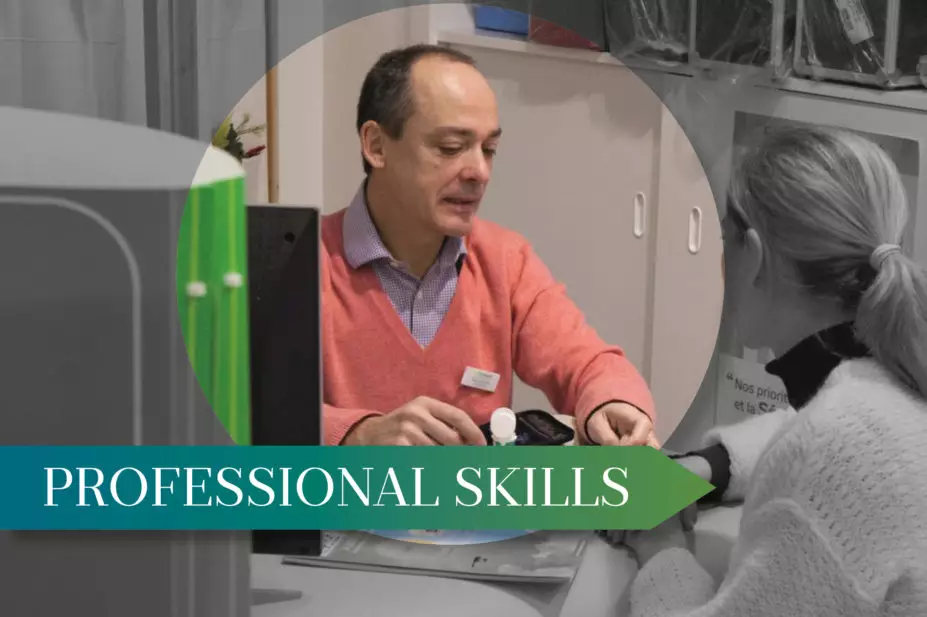
BSIP SA / Alamy Stock Photo
The concept of trust is important in healthcare because health and healthcare in general involve an element of uncertainty and risk for the vulnerable patient who is reliant on the competence and intentions of the healthcare professional[1]
. The Oxford English Dictionary defines trust as the “firm belief in the reliability, truth, or ability of someone or something”[2]
.
High levels of trust have been associated with many benefits, including a perception of better care, greater acceptance to recommended treatment and adherence to that treatment, lower anxiety in relation to any treatment taken, and reportedly facilitates access to health services[3],[4],[5],[6],[7]
. Patients are more likely to open up and disclose information if they trust their pharmacist or healthcare professional, and the quality of interaction may improve, resulting in greater patient autonomy and shared decision-making[3],[4],[5],[6],[7]
.
A report published in 2015 on behalf of the General Pharmaceutical Council (GPhC), the independent regulator for pharmacists, pharmacy technicians and pharmacy premises in Great Britain, showed that public trust in advice from pharmacists was high (87% of those asked said they trusted a pharmacist a fair amount or a great deal), but the degree of that trust was significantly weaker in pharmacists than in other healthcare professionals (only 39% trusted a pharmacist a great deal[8]
). Perhaps this is unsurprising considering the Which? report of 2013, which found that mystery shoppers were given unsatisfactory advice during 43% of visits to 122 community pharmacies across the UK[9]
.
Individual studies have determined various factors that influence trust in healthcare professionals[10],[11],[12],[13],[14]
but this article focuses on the essential elements of trust as identified in a discussion paper from the Nuffield Trust in 2004 entitled ‘Trust in Healthcare’[15]
, namely:
- Competence in knowledge;
- Competence in social/communication skills;
- Honesty;
- Confidentiality and caring;
- Showing respect.
Competence in knowledge
Section 5 of the GPhC standards of conduct, ethics and performance[16]
is dedicated to ensuring all pharmacy professionals develop their professional knowledge and competence in life-long learning, with the requirement to “maintain and improve the quality of practice by keeping knowledge and skills up to date and relevant to the role and responsibilities”. In order to maintain public trust in their capabilities, pharmacists must meet standards of safe and effective practice throughout their careers. As such, they have an obligation to declare that they are fit to practise, and provide a minimum of nine continuing professional development (CPD) entries annually[17]
. Healthcare professionals begin to gain patients’ trust by being knowledgeable in their specific field of practice and, as a result, patients have confidence and feel secure in the advice provided.
However, mistakes happen. Work is currently ongoing regarding the development of professional standards for error reporting, through which patient safety will be enhanced by sharing and learning from errors and near misses[18]
. There is a statutory duty of candour that dictates patients are given “accurate, truthful, prompt information when mistakes are made and treatment does not go to plan”[19]
. Patients are far more likely to trust pharmacists and healthcare professionals who are open and honest in their approach, admit to errors, apologise and do everything in their power to rectify any mistake (see ‘Box 1: Competence in knowledge — points to consider’).
Box 1: Competence in knowledge — points to consider
- Identify and address training needs for both yourself and your staff on a regular basis;
- Always work within your competence and refer on, or seek advice, whenever necessary;
- Encourage a culture of openness within your team, log and report all errors and near misses, undertake root cause analyses on errors and share any learning with all staff;
- Ensure all staff are aware of how to respond to and deal with patient complaints in an open and honest way (see ‘Box 2: Essential messages from the ‘Saying sorry’ NHS Litigation Authority leaflet’);
- Consider Royal Pharmaceutical Society (RPS) Faculty membership as an opportunity to evaluate your competence.
Box 2: Essential messages from the ‘Saying sorry’ NHS Litigation Authority leaflet
- Timeliness: the initial discussion with the patient and their family should occur as soon as possible after recognition that something has gone wrong;
- Explanation: patients and their families should be provided with a step-by-step explanation of what happened, which considers their individual needs and is delivered openly;
- Information: patients and their families should receive clear, unambiguous information. They should not receive conflicting information from different members of staff. The use of medical jargon and acronyms should be avoided;
- Ongoing support: patients and their families should be given a single point of contact for any questions or requests they may have. They should also be provided with support in a manner appropriate to their needs. This involves consideration of special circumstances, which can include a patient requiring additional support, such as an independent patient advocate or a translator;
- Confidentiality: policies and procedures should give full consideration of, and respect for, privacy and confidentiality for the patient, their family and staff;
- Continuity of care: patients are entitled to expect that they will continue to receive all usual treatment and continue to be treated with dignity, respect and compassion. If a patient expresses a preference for their healthcare needs to be taken over by another team, the appropriate arrangements should be made for them to receive treatment elsewhere.
Competence in social or communication skills
All pharmacists and healthcare professionals are required to communicate effectively with patients and should adapt their communication style to meet the needs of the patient, in accordance with GPhC standards[16]
. Effective communication skills include an awareness of non-verbal as well as verbal communication. Actively listening to patients, without interruption, is important (see ‘Box 3: Ways to demonstrate active listening’). It is important that patients feel they are being listened to and given information in a respectful, non-judgmental way; this will help build a trusted relationship. Pharmacists and healthcare professionals should demonstrate empathy, as well as competence and confidence, to encourage full disclosure from patients.
Box 3: Ways to demonstrate active listening
- Paraphrasing: putting the information you have heard into your own words;
- Summarising: concisely reiterating the main points of the discussion;
- Clarifying: aim to clarify any confusing messages immediately;
- Reflection: processing and reiterating the information in your own words, while mirroring the behaviours a patient may be demonstrating.
Source: Centre for Pharmacy Postgraduate Education (CPPE). Consultation skills for pharmacy practice: taking a patient-centred approach. DLP 172. February 2014; page 77. Available at: http://www.consultationskillsforpharmacy.com/docs/docb.pdf
All healthcare professionals are required, as per NHS policy, to provide patient-centred care. Patient-centred care means that patients should be given the opportunity to have full involvement in all decisions affecting them[20]
. Pharmacists should ensure that when advising or counselling patients, shared decision-making is undertaken (i.e. providing patients with sufficient information they need to make an informed decision). Pharmacists must also accept the patient’s decision, even if it does not align with what they believe is in the patient’s best interest.
Two resources available to support pharmacists and healthcare professionals’ development towards effective consultation skills and a patient-centred approach include:
- A Centre for Pharmacy Postgraduate Education (CPPE) programme entitled ‘Consultation skills for pharmacy practice: taking a patient-centred approach’[21]
; - The NHS shared decision-making website, which offers examples of decision aids that can be used during consultations[22]
.
Ultimately, pharmacists and healthcare professionals must reflect on their practice and develop these skills over time.
Honesty
Pharmacists are expected to act with honesty and integrity to maintain public trust in and uphold the reputation of the profession[16]
. It is essential that patients have confidence in their pharmacist or healthcare professional’s ability to advise them appropriately and believe that they are acting in their best interests at all times. If patients feel pharmacists are being dishonest in any way, they are likely to lose their respect and credibility.
Conducting the pharmacy business in an ethical manner is also important to build a trusting relationship by being open and honest in dealings with patients. For example, this may mean only conducting medicines use reviews (MURs) when there is a clear clinical need, despite the pressure of targets, or recommending the most appropriate non-prescription medicine product for the patient rather than the one with the greater profit margin.
Confidentiality
Patients need to know that they can trust pharmacists and healthcare professionals to respect their privacy and dignity, otherwise this may prevent them from being able to ask for advice or share information. If confidentiality of a patient is breached, it may not only harm the individual relationship with the patient, but also the trust that patient has built with any healthcare professional. Lack of privacy in community pharmacies was highlighted as a cause for concern in the GPhC ‘Public perceptions’ report, therefore, it is clearly important to patients[8]
. Investing in the designation of a private space or room in your pharmacy is highly recommended to nurture public perception of the availability of privacy in community pharmacy.
Confidentiality is a legal requirement, the principles of which are embedded in the GPhC standards[16]
, with detailed guidance available separately[23]
. It is important that staff are trained so that they are not only aware of the laws and regulations, but also of how they apply in day-to-day practice. Some practical examples are included in ‘Box 4: Confidentiality in the pharmacy’.
There may be times when pharmacists and healthcare professionals are asked to disclose confidential patient information. In the first instance, patient consent to do so should be obtained. If this is not possible or would undermine the purpose of the disclosure, the pharmacist or healthcare professional needs to be satisfied that the disclosure is appropriate and meets any legal requirements surrounding confidentiality[23]
. When unsure, further advice should be sought before divulging information. In addition, a full record of any requests or associated actions should be made; ultimately the pharmacist or healthcare professional must be able to justify any decisions and actions taken.
Box 4: Confidentiality in the pharmacy
Do:
- Ensure new staff are trained from day one regarding the principles of confidentiality and provide regular training updates to all staff;
- Lead by example to instil the importance of confidentiality in your staff;
- Ensure discussions relating to patients’ medicines in the dispensary cannot be overheard by the public;
- Offer to take patients to a consultation room to speak privately;
- Acquire consent for all the professional services you provide and the patient information you use;
- Ensure all sensitive data are stored securely and electronic data are backed up regularly;
- Maintain confidentiality even after a patient has died.
Do not:
- Leave personal information lying around where it can be seen by others (e.g. on the medicines counter);
- Access a patient’s summary care record unless it is for a valid clinical or professional reason;
- Discuss patients’ medical or personal issues except for valid reasons;
- Post patients’ personal issues on websites, internet chat forums or social media (even if you do not name the patient, there may be enough information for people to make an educated guess as to whom you are referring).
Showing respect and caring
An important element of a lasting professional relationship is respect. The GPhC standards state that cultural diversity and the right for patients to hold their own values and beliefs must be respected. Pharmacists and healthcare professionals have an obligation not to allow any personal prejudices they may hold to detract from providing the highest quality patient care. Professional boundaries must also be maintained at all times; if these are crossed, patients may lose trust and confidence in pharmacists, healthcare professionals and the profession[24]
.
Every patient deserves to be treated with dignity and respect, and by encouraging patients to deliberate and make choices through shared decision-making, patient autonomy is upheld[25]
. Being compassionate, spending appropriate time with patients, demonstrating active listening, and helping to advise and resolve the patient’s problems will all contribute to building a trusting, respectful relationship.
Pharmacists and healthcare professionals have a moral obligation to build trust with patients and represent their profession in a trustworthy manner. It is important to remember that trust is a fragile concept; once interpersonal trust is lost, it can be difficult to rebuild[26]
. The GPhC’s ‘Consultation on standards for pharmacy professionals’ contains many standards that are important for the development and maintenance of trusting relationships with patients. Specifically, the requirements: to provide patient-centred care; to communicate effectively; to maintain, develop and use your professional knowledge and skills; to behave in a professional manner (specifically to be trustworthy and act with honesty and integrity); and finally, to respect and maintain patients’ confidentiality/privacy[27]
. Under often difficult and stressful working conditions, pharmacists and healthcare professionals should strive to raise standards so that every opportunity to interact with, or on behalf of, patients helps towards building and maintaining trust.
Reading this article counts towards your CPD
You can use the following forms to record your learning and action points from this article from Pharmaceutical Journal Publications.
Your CPD module results are stored against your account here at The Pharmaceutical Journal. You must be registered and logged into the site to do this. To review your module results, go to the ‘My Account’ tab and then ‘My CPD’.
Any training, learning or development activities that you undertake for CPD can also be recorded as evidence as part of your RPS Faculty practice-based portfolio when preparing for Faculty membership. To start your RPS Faculty journey today, access the portfolio and tools at www.rpharms.com/Faculty
If your learning was planned in advance, please click:
If your learning was spontaneous, please click:
References
[1] Alaszewski A. Risk, trust and health. Health Risk Soc 2003;5(3):235–239. doi: 10.1080/13698570310001606941
[2] Oxford English Dictionary. Available at: http://www.oxforddictionaries.com/definition/english/trust (accessed September 2016)
[3] Caterinicchio RP. Testing plausible path models of interpersonal trust in patient–physician treatment relationships. Soc Sci Med 1979;13:81–99. doi: 10.1016/0271-7123(79)90011-7
[4] Joffe S, Manocchia M, Weeks JC et al. What do patients value in their hospital care? An empirical perspective on autonomy centred bioethics. J Med Ethics 2003;29:103–108. doi: 10.1136/jme.29.2.103
[5] Jackson LA, Putnam W, Twohig PL et al. What has trust got to do with it? Cardiac risk reduction and family physicians’ discussions of evidence-based recommendations. Health Risk Soc 2004;6(3):239–255. doi: 10.1080/1369857042000275650
[6] Booth ML, Bernard D, Quine S et al. Access to health care among Australian adolescents: young people’s perspectives and their sociodemographic distribution. J Adolesc Health 2004;34:97–103. doi: 10.1016/s1054-139x(03)00304-5
[7] Gilson L. Trust and the development of health care as a social institution. Soc Sci Med 2003;56(7):1453–1468. doi: 10.1016/s0277-9536(02)00142-9
[8] Ipsos Public Affairs. Public perceptions of pharmacies. The General Pharmaceutical Council Final report. 2015. Available at: http://www.pharmacyregulation.org/sites/default/files/gphc_public_perceptions_report_-_final.pdf (accessed September 2016)
[9] Which? News. Can you trust your local pharmacy’s advice?Which? investigation finds best and worst companies. 20 May 2013. Available at: http://www.which.co.uk/news/2013/05/can-you-trust-your-local-pharmacys-advice-319886/ (accessed September 2016)
[10] Thom DH & Campbell B. Patient–physician trust: an exploratory study. J Fam Pract 1997;44(2):169–176. PMID: 9040520
[11] Gopichandran V & Chetlapalli SK. Factors influencing trust in doctors: a community segmentation strategy for quality improvement in healthcare. BMJ Open 2013;3:e004115. doi: 10.1136/bmjopen-2013-0041 15
[12] Bell L & Duffy A. A concept analysis of nurse–patient trust. Br J Nurs 2009;18(1):46–51. doi: 10.12968/bjon.2009.18.1.32091
[13] Rowe R & Calnan M. Trust relations in health care: developing a theoretical framework for the “new” NHS. J Health Organ Manag 2006;20(5):376–396. doi: 10.1108/14777260610701777
[14] Rørtveit K, Hansen BS, Leiknes I et al. Patients’ experiences of trust in the patient–nurse relationship—a systematic review of qualitative studies. Open J Nurs 2015;5:195–209. doi: 10.4236/ojn.2015.53024
[15] Calnan N & Rowe R. Trust in Healthcare. An agenda for future research (discussion paper). Nuffield Trust Seminar, 17 Nov 2004. Available at: http://www.nuffieldtrust.org.uk/sites/files/nuffield/event/Trust%20In%20Health%20Care.pdf (accessed September 2016)
[16] General Pharmaceutical Council. Standards of conduct, ethics and performance. 2012. Available at: https://www.pharmacyregulation.org/sites/default/files/standards_of_conduct_ethics_and_performance_july_2014.pdf (accessed September 2016)
[17] General Pharmaceutical Council. Standards for continuing professional development. 2010. Available at: https://www.pharmacyregulation.org/sites/default/files/Standards%20for%20continuing%20professional%20development%20s.pdf (accessed September 2016)
[18] Royal Pharmaceutical Society. Have your say on our new error reporting standards. 2015. Available at: http://www.rpharms.com/what-s-happening-/news_show.asp?id=2845 (accessed September 2016)
[19] NHS Litigation Authority. NHS Litigation Authority guidance on candour. November 2014. Available at: http://www.nhsla.com/OtherServices/Documents/NHS%20LA%20-%20Duty%20of%20Candour.pdf (accessed September 2016)
[20] Department of Health. Liberating the NHS: no decision about me, without me. Government response. December 2012. Available at: https://www.gov.uk/government/uploads/system/uploads/attachment_data/file/216980/Liberating-the-NHS-No-decision-about-me-without-me-Government-response.pdf (accessed October 2016)
[21] Centre for Pharmacy Postgraduate Education. Consultation skills for pharmacy practice: taking a patient-centred approach. 2014.
[22] NHS Shared decision making. Written by the BMJ Group. Available at: http://sdm.rightcare.nhs.uk/ (accessed September 2016)
[23] General Pharmaceutical Council. Guidance on patient confidentiality. 2012. Available at: https://www.pharmacyregulation.org/sites/default/files/guidance_on_confidentiality_april_2012_14.pdf (accessed September 2016)
[24] General Pharmaceutical Council. Guidance on maintaining clear sexual boundaries. 2012. Available at: https://www.pharmacyregulation.org/sites/default/files/GPHC%20Guidance%20on%20sexual%20boundaries.pdf (accessed September 2016)
[25] Duggan PS, Geller G, Cooper LA et al. The moral nature of patient-centeredness: is it ‘‘just the right thing to do’’? Patient Educ Couns 2006;62:271–276. doi: 10.1016/j.pec.2005.08.001
[26] Hupcey JE & Miller J. Community dwelling adults’ perception of interpersonal trust vs. trust in health care providers. J Clin Nurs 2006;15:1132–1139. doi: 10.1111/j.1365-2702.2006.01386.x
[27] General Pharmaceutical Council. Consultation on standards for pharmacy professionals. 2016. Available at: https://www.pharmacyregulation.org/sites/default/files/consultation_on_standards_for_pharmacy_professionals_april_2016.pdf (accessed September 2016)


